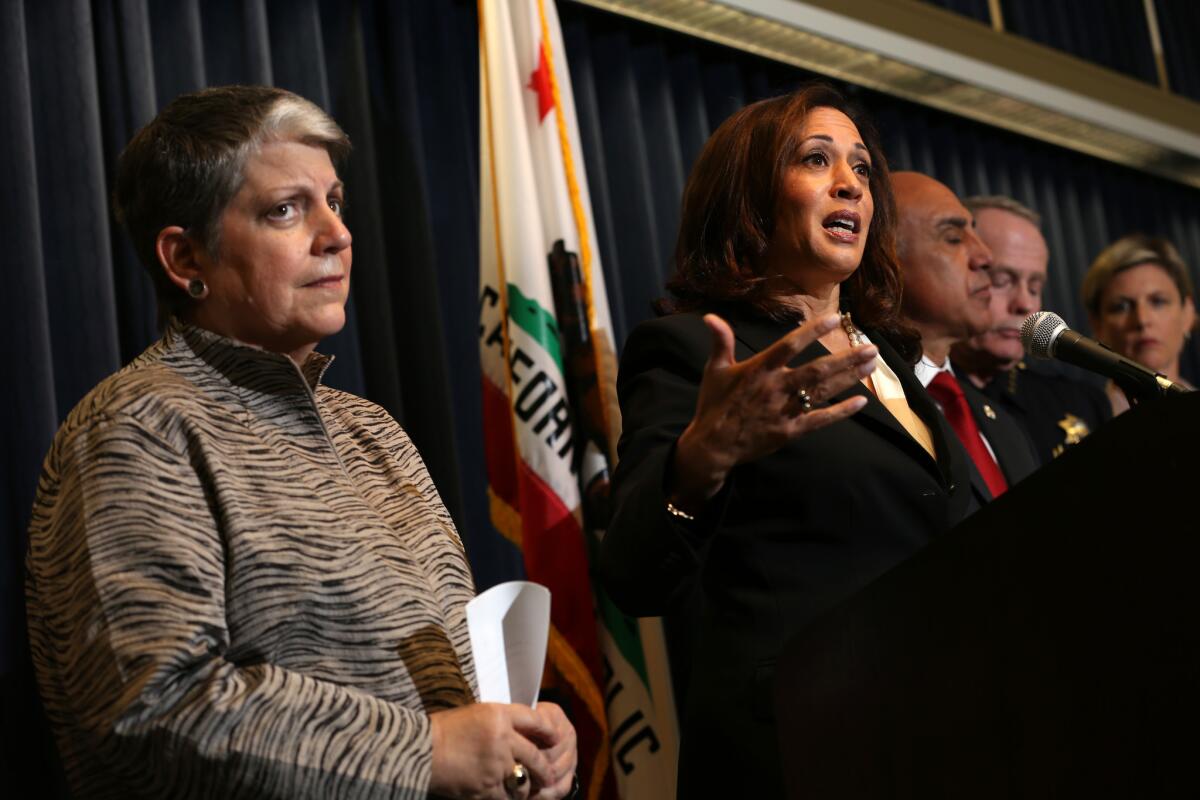Plan for police-campus coordination on sex assault cases unveiled

UC President Janet Napolitano, left, listens as Atty. Gen. Kamala D. Harris speak at a news conference announcing efforts to address campus sexual assault.
California Atty. Gen. Kamala D. Harris unveiled a model blueprint Wednesday to improve coordination between law enforcement and colleges on campus sexual assault cases.
Harris, who was flanked by University of California President Janet Napolitano and others, said the model memorandum of understanding would help clarify such responsibilities as who would collect evidence and interview witnesses while better supporting those reporting sexual assaults. She said the lack of clear communication, adequate training and designated areas of responsibility too often resulted in disjointed efforts between campus officials and police -- and further trauma for victims.
In one 2013 case, she said, a 19-year-old Mills College student who reported being raped had to hire an attorney to locate the detective who took her original police report but failed to follow up. When she was finally interviewed, she was asked about her virginity and told she was confusing “rough sex” with rape, Harris said.
“There are silos between college systems and separate silos around law enforcement,” Harris said. “This [agreement] seeks to combine the resources we collectively have.”
Napolitano said the 10-campus UC system would adopt the blueprint, which she said was the first statewide effort in the nation to lay out guidelines for cooperation among campus officials, law enforcement, advocacy groups and others. She said coordination on UC cases was “very episodic” but that the new plan would bring them “uniformity and consistency.”
“There is now a road map,” Napolitano said. “This will give California survivors greater confidence that perpetrators will experience consequences.”
In recent years, the federal government has launched an unprecedented campaign against campus sexual assault, with more investigations, fines and guidelines than ever before. But many college officials have fretted that they are untrained to conduct investigations, while some local police have expressed concerns that multiple parties investigating the same cases could taint witnesses or compromise evidence.
Harris said she and Napolitano had agreed to work together to combat campus sexual misconduct during a conversation shortly after the UC president was named to her post in September 2013. The model blueprint was one result, she said.
Harris and Napolitano were joined by San Bernardino County Dist. Atty. Mike Ramos, UCLA student activist Savannah Badalich and others. Ramos said he has already appointed a liaison to coordinate sexual assault cases at Cal State San Bernardino and the University of Redlands.
A UC survey released last year found that 6% of undergraduate respondents reported experiencing unwanted sexual conduct, including forced fondling and rape. UC officials unveiled a systemwide plan last September to better combat sexual misconduct.
Twitter: @TeresaWatanabe
More to Read
Sign up for Essential California
The most important California stories and recommendations in your inbox every morning.
You may occasionally receive promotional content from the Los Angeles Times.










